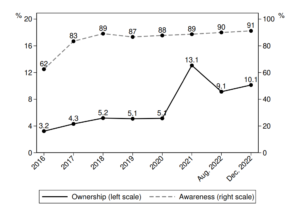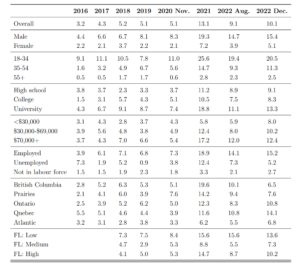
Decline in Canadian Bitcoin, Crypto Ownership in 2022
The Bank of Canada (BoC) reported a decline in Bitcoin and cryptocurrency ownership in Canada in 2022, as neither market conditions nor regulations favored Canadian crypto investors, according to a study published by the BoC on July 26.
The study includes data from the annual Bitcoin Omnibus Survey conducted by the Canadian central bank, which revealed a reversal from the enormous adoption of cryptocurrencies observed in 2021.

The graph above demonstrates that Bitcoin ownership in Canada fell to 9% by August 2022.
However, BTC adoption increased marginally to 10% by the end of the year, and the decline in Bitcoin ownership does not indicate that investors diversified their holdings among other cryptocurrencies. The report read:
“Investors did not appear to shift out of Bitcoin and into other cryptoassets, as we observe decreased ownership of altcoins.”
According to more than one-third of the 4,996 respondents to a survey conducted by the Bank of Canada in 2022, the primary reason Canadians are interested in Bitcoin is as an investment.

The majority of Canadian crypto assets were acquired through mobile and web applications.
For the second year, Bitcoin and crypto mining ranked as the third-most popular methods for accumulating tokens.
In the altcoin ecosystem, Dogecoin was the most sought-after cryptocurrency investment due to the uproar generated by Elon Musk and its history of random price increases.
Ether, Bitcoin Cash (BCH), and Litecoin were additional altcoins popular among Canadians.
According to the BoC, the research is pertinent for monitoring the two conditions that could necessitate the issuance of an in-house central bank digital currency (CBDC): “if Canadians almost or completely stop using cash, or if Canadians widely adopt and use private cryptocurrencies for payments.”
The Bank of Canada highlighted the contributions of ecosystem collapses, regulatory obstacles, and price depreciation to the decline in cryptocurrency ownership.
As a result of the government’s intention to provide regulatory clarity and the region’s stable market, the demand for crypto is anticipated to increase.
